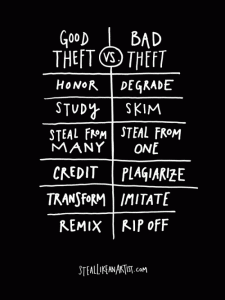[Photo: “Crackers,” CC BY 2.0 by elhombredenegro]
I’m going to write about something that happened a while ago but which I’ve kept quiet about.
Someone plagiarized me.
It wasn’t a 100% word for word plagiarism, but this person’s piece imitated mine in style and structure, line by line. The opening in fact was almost exactly the same – except for a couple of words swapped out – and with one sentence copied verbatim. This person also tried to imitate my voice but failed, in my opinion.
I was very upset and didn’t know what to do. Call this person out on it? Alert the editor (who had also published my piece but sees hundreds, if not thousands, pieces of writing and had probably forgotten)? Make a snotty comment on the plagiarizer’s piece?
I was told that perhaps this person didn’t realize what they were doing, that I should play nice, make a joke of it. “They say imitation is the sincerest form of flattery, but this is ridiculous.” WINK. Wink cuz, you know, it’s no big deal. In the end, I did nothing except hold a silent grudge, which I hold to this day, vowing never to help this person or promote any of their work.
Now someone I know is experiencing something similar, and their “supporters” are also responding with “be nice” comments. “The thief didn’t mean it!” “They probably didn’t even realize they were doing it!” Hearing about this person’s experience made me relive my own, and I decided I couldn’t keep quiet about it anymore.
Here are some plagiarism myths that need to be put to rest.
Copying structure and syntax isn’t plagiarism. First, the basics: the definition of plagiarism. Plagiarism.org gives an excellent one:
- turning in someone else’s work as your own
- copying words or ideas from someone else without giving credit
- failing to put a quotation in quotation marks
- giving incorrect information about the source of a quotation
- changing words but copying the sentence structure of a source without giving credit
- copying so many words or ideas from a source that it makes up the majority of your work, whether you give credit or not (see our section on “fair use” rules)
How hard is it to put quotes around something and say “according to So-and-So” and give a link. Are plagiarizers so insecure that they can’t admit that they get ideas from elsewhere? They have to claim every idea as their own? Some stuff I write is almost all quotes and attributions, and people still read and enjoy it.
“Imitation is the sincerest form of flattering.” BULL-FUCKING-SHIT. Imitation with proper attribution and credit may be a great form of flattery. Otherwise, it’s outright fucking stealing.
I love Austin Kleon‘s distinctions between “good theft” and “bad theft.” I’ll let his image speak for me:
See? Study is good; skim – as in skim an article and not read it carefully enough to give proper attribution – is bad. Stealing from one is bad. Credit good, plagiarism bad. Transform good, imitate bad. Speaking of which. . .
Imitation does not equal inspiration. My essay, I’m Glad My Husband Cheated, was inspired by this essay, I Slept With Your Husband. Here’s Why. My piece, in the form of a letter from a wife to her husband’s mistress, was a response to the latter, a letter from the mistress to the cheating husband’s wife. I didn’t go and play Mad Libs with that essay, swapping out details. It was an original response. A transformation.
Still, I went out of my way to tell the editor my essay was a direct response to I Slept With Your Husband, and if she thought the style was too similar, I would change it. However, she didn’t, and in fact both essays ended up the website’s favorite articles of the year.
“Err on the side of the generosity.” Fuck that shit. If this happens again, I’m confronting the thief directly. Don’t get me wrong. I’ll give them a chance to take their stuff down, but if they don’t, watch the fuck out.
Be nice. Again, FUCK IT. And I don’t mean “don’t be kind.” Being kind and being nice are two different things. People who care about being nice care about how they appear. People who care about being kind care about others’ feelings.
Like Wil Wheaton says, don’t be a dick, which includes don’t steal my stuff because I will cut you. . .with my words. (And in other ways if need be.)
Writers need other writers. For advice, feedback, promotion. A writer screwing over another writer is about the dumbest thing they can do for their career.
Tags: plagiarism, stealing, writing

